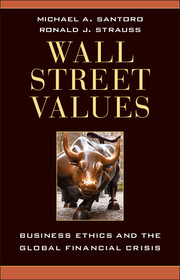Book contents
- Frontmatter
- Contents
- Preface
- Acknowledgments
- Part One Background and Theoretical Framework
- Part Two Wall Street Business Model, Regulation, and Values in Transition
- Chapter Three The Gathering Storm
- Chapter Four From Financial Services to Proprietary Trading
- Chapter Five Secrets and Lies
- Part Three Policy Recommendations and Sustainable Values for Wall Street in the Twenty-First Century
- Notes
- Index
Chapter Three - The Gathering Storm
Government Missteps and Inattentiveness Contribute to the Financial Crisis
from Part Two - Wall Street Business Model, Regulation, and Values in Transition
Published online by Cambridge University Press: 05 February 2013
- Frontmatter
- Contents
- Preface
- Acknowledgments
- Part One Background and Theoretical Framework
- Part Two Wall Street Business Model, Regulation, and Values in Transition
- Chapter Three The Gathering Storm
- Chapter Four From Financial Services to Proprietary Trading
- Chapter Five Secrets and Lies
- Part Three Policy Recommendations and Sustainable Values for Wall Street in the Twenty-First Century
- Notes
- Index
Summary
Still, if you will not fight for the right when you can easily win without bloodshed, if you will not fight when your victory will be sure and not so costly, you may come to the moment when you will have to fight with all the odds against you and only a precarious chance for survival.
Sir Winston Churchill, The Gathering Storm (1948)We do not accept the view that regulators lacked the power to protect the financial system. They had ample power in many arenas and they chose not to use it. To give just three examples: the Securities and Exchange Commission could have required more capital and halted risky practices at the big investment banks. It did not. The Federal Reserve Bank of New York and other regulators could have clamped down on Citigroup’s excesses in the run-up to the crisis. They did not. Policy makers and regulators could have stopped the runaway mortgage securitization train. They did not. In case after case after case, regulators continued to rate the institutions they oversaw as safe and sound even in the face of mounting troubles, often downgrading them just before their collapse. And where regulators lacked authority, they could have sought it. Too often, they lacked the political will – in a political and ideological environment that constrained it – as well as the fortitude to critically challenge the institutions and the entire system they were entrusted to oversee.
The Financial Crisis Inquiry Commission Report (2011)Introduction: Ideology Overwhelms Experience
The financial crisis sprang from two mutually reinforcing institutional transformations – one on Wall Street and another in Washington. Fueled by an explosive mix of megamergers, massive capital formation, increased leverage, and runaway technical wizardry, the Wall Street business model evolved from providing a diversified mix of financial services for valued clients to one dominated by the investment of a firm’s own capital in increasingly complex and risky securities, often at the expense of a firm’s customers who came to be viewed as counterparties. The most telltale sign of Wall Street’s transformation was the exponential growth and increasing importance of precisely the kind of proprietary trading, particularly of CMOs, at the center of the financial crisis. Facilitating all this was a parallel retreat in Washington’s oversight of the financial industry.
- Type
- Chapter
- Information
- Wall Street ValuesBusiness Ethics and the Global Financial Crisis, pp. 61 - 89Publisher: Cambridge University PressPrint publication year: 2012

